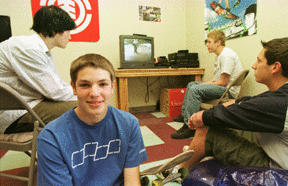As with others spheres of youth culture, the skateboard business can be driven as much by fashion as functionality.
So concedes Cameron Weiss, the young entrepreneur behind the ABCM Board Shop on Madison Avenue.
“Something’ll be the coolest thing one week,” Weiss said, “and the next week, no one wants it because everyone’s got it.”
His plan for market research:
“A bunch of friends, they tell me what they like, and I order that stuff.”
The ABCM shop opened this month under the management of 14-year-old Weiss, a freshman at Bainbridge High School.
Despite his years, it’s actually Weiss’ second entrepreneurial venture; his first was selling fine watches over the Internet, but in his words, the effort “kind of failed.”
Undaunted, Weiss saw new opportunity in a community enjoying a renaissance of riding since a new $100,000 skate bowl opened at Strawberry Hill Park last year.
The precise number of “serious” riders on Bainbridge these days is hard to ascertain; Weiss puts the figure at “a lot.”
Too, the island has been without a skate shop for about five years, since a previous outfit moved to Bremerton. Where consumer want was unmet by supply, Weiss stepped in with a plan.
“I just really wanted to open it, and I knew there was a demand,” he said. “So I just went for it.”
As the ABCM moniker suggests, it’s truly a “family” business – the acronym stands for father Alan Weiss, brother Brandon, Cameron and mom Maureen – and his parents are technically the owners.
But it was up to Cameron to get the venture off the ground. For capital, he used some $5,000 amassed over a period of three years – income from odd jobs and birthday and holiday gifts – which he had planned to spend on a car.
And in the 12 months it took to get the shop off the ground, he encountered the usual challenges faced by the startup business, and some less common.
First there was the dearth of suitable locations around town – lots of vacant office space, but little retail. But he also found that his potential customer base – kids with skateboards – was not a good fit for some potential landlords, who didn’t want riders in their parking areas or loitering around other tenants.
It’s a bad rap Weiss doesn’t agree with; he, for example, “works hard to be an honor student,” and wants to put the business on his college applications.
Then he discovered the old Packard building on Madison Avenue, vacant for the past two years after a quickie-lube outfit there failed. The leasing agents was offering spaces of various sizes in the building, and Weiss took the front lobby.
“It was the right price, it was a good location, and they wanted to have someone in here,” he said. “It worked out perfectly.”
The sport
Baby boomers recall it differently, but skateboarding has come a long way since the scrap-wood-and-rollerskate-wheels days.
Equipment once found in toy-store aisles has evolved with other “extreme sports” into a specialized avocation, a lucrative business driven by sophisticated marketing and demographic studies.
According to recent figures by the International Association of Skateboard Companies:
l There are 16 million skateboarders in the United States;
l About 100,000 professional skateboard decks and 500,000 wheels are manufactured each month;
l Skateboards and related products from 300 manufacturers of pro-quality equipment generate $1.4 billion in annual retail sales.
Some of that money is now flowing into pockets of young Weiss, who sold four skateboard decks in his first week.
The shop also features helmets and apparel, emblazoned with skateboard motifs and the logos of equipment companies. By winter, Weiss plans to introduce a line of snowboards and related gear. But he’ll steer clear of bicycles, skis and other goods already available from island retailers.
Prices, he says, will be competitive with other area retailers. A new set of wheels will set a rider back about $25.95; the axle assemblies known as “trucks,” $21.95; decks, around $40.
A complete, professional-quality board can be had for around $129.
And the shop may become a social nexus of sorts; Monday afternoon, Cameron’s brother Brandon and several friends gathered at the business after school.
“It’s bomb,” said Corey Guy, who Cameron credits with getting him into the sport a year ago. “It’s like a fun place to hang out and watch skate videos and listen to music.”
While he may hire extra help for the summer months, Weiss will man the shop after school each day and on Saturdays.
“I figure I’ve already been working on it for a year,” he said. “Why stop now?”



